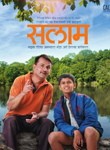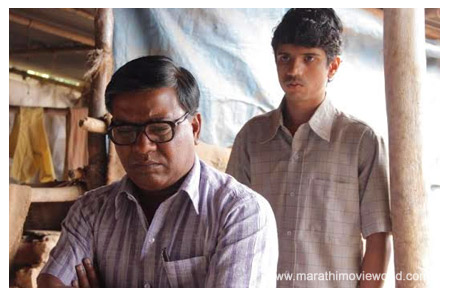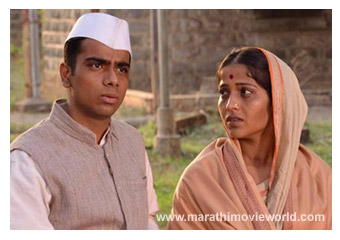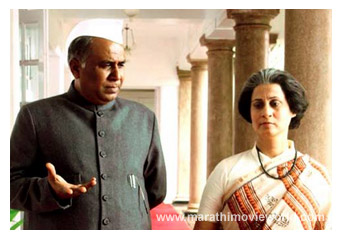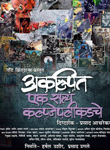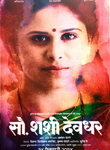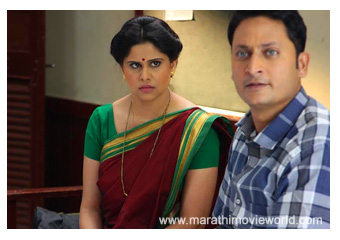‘Bhakarkhadi 7 kms’ is a compliment to young doctors practising in villages
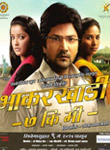 |
Rating: ★★★★
Studio / Presenter: Panoramic Group, Vidyan Siddhi Films Ltd Producer: Dr. Dinesh Vaidya Director: Umesh Namjoshi Writer: Dr.Dinesh Vaidya Cinematographer: Prasad Bhende Music: Kamlesh Bhadkamkar Cast: Aniket Vishwasrao, Veena Jamkar, Suyash Tilak, Apoorva Nemlekar, Renuka Shahane, Dr. Girish Oak, Late Anand Abhyankar, Ashok Samel and Bharat Ganeshpure, Uday Tikekar Movie Review by: Ulhas Shirke |
Only last week we saw a Marathi film ‘Salaam’, which was a tribute to brave soldiers and policemen. Now, film maker Umesh Namjoshi presents his new Marathi film ‘Bhakharkhadi 7 km’, which is not only a compliment to young doctors practising in remote villages, but also an inspiring film to all those young doctors, who hate to practice in our country and aspire to go abroad.
‘Bhakharkhadi 7 km’ tells the story of a young doctor Sameer Deshmukh (Aniket Vishwasrao), who aspires to take up a career as a surgeon in USA after completing his fellowship with Boston Medical College. His dreams are shattered by his involvement in one emergency surgery in a hospital in Mumbai, when the dirty politics played by a Politician, makes him a scapegoat and he is sent to a remote village Bakharkadi off. Melghat, as a punishment.
At the primary health center of this place, he comes across an attending Nurse Renu ( Veena Jamkar), who tries to understand his frustration and reminds him of his duty as a doctor. In the process, the film highlights rural Marathi culture and lifestyle of the villagers, besides their blind faith ; as a result of which, there are sudden deaths of villagers. Using his common sense and medical knowledge, Dr. Sameer makes use of home remedy i.e. activated charcoal powder to treat the people for first aid, as they are poisoned in an epidemic, after drinking the so called holly water, from a particular well, which is not used throughout the year.
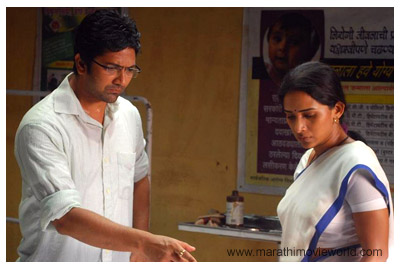
The entire film is based on the duties of a doctor and how people hold them responsible for death of a patient, during operation. In the film, we witness one such incident, where a junior surgeon has to attend to a post operation emergency, in the absence of his senior, whom he is out of station and unable to reach over phone. The patient dies during operation and the patient’s father, who is a Politician attacks the hospital, with the help of his goons. He also wants the junior doctor to be suspended. However, after an inquiry, the doctor is sent on a punishment posting for three years, to a remote village. It is at this remote village, he understands the real duty of a doctor. In fact, in the concluding scene, he does admit that he neither wants to go abroad nor wants to go to a village; but, is required to go, because the village needs his services.
Director Umesh Namjoshi has very effectively developed the story written by Dr. Dinesh Vaidya, into a presentable screenplay, with the help of Nandu Pardeshi, who has also written the effective dialogues of this film. Music has little scope; but the two songs played on the background on the music of kamlesh Bhadkamkar are picturised well. Also , the beautiful photography is captured by Prasad Bhende. The film has very cleverly highlighted the brain drain issue, besides throwing light on the corruption at the administrative level in Health department. But, it has also shown, how a young doctor overcomes all these issues, with the help of a Nurse and other assistants, who motivate him.
Aniket Vishwasrao who plays the central character of Dr. Sameer, in this film; has got a memorable role, which has exploited his talent. We have always seen Aniket as a romantic or action hero; but, this film has offered him a good role; where he has ample scope to display his emotions very efficiently. His performance in this film, is worth to be considered for nomination in best actor’s category, for 2014 awards. Veena Jamkar, who is known for playing a simple woman’s role, has offered good support in the female lead. The film also presents Apoorva Nemlekar in the parallel female lead, as Sameer’s associate and close friend from the Hospital. But, she has limited scope, though she has done a good job. Another important role is by Suyash Tilak, who plays Sameer’s close friend from media.
Renuka Shahane, ActressRenuka Shahane who has done a comeback into Marathi films, has done well in the role of Sameer’s mother and a businesswoman. She too has limited scope. Renowned artistes like Uday Tikekar, Anant Jog, Dr. Girish Oak, Late Anand Abhyankar, Ashok Samel and Bharat Ganeshpure have offered good support through their restricted roles of medical professionals.
Director Umesh Namjoshi has done a fairly good job, in presenting many important sequences in the film, like the emergency Tracheotomy performed by Dr. Sameer on the road; also Dr. Sameer’s frustration on reaching the village of his posting on punishment and his concern and risk taken while treating patients, during the spread of disease, due to consumption of contaminated water. However, he has not been able to show the reaction of people well, who attack the doctors house; when his mother also suffers an injury. This scene doesn’t look realistic. But, barring this lapse, he has handled the rest of the film very well.
‘Bhakharkhadi 7 km’ has a very strong message to convey and is a ‘must watch’ for all those young doctors in Maharashtra. It’s also a compliment to all those doctors, who are sincerely practising their profession in remote villages.
‘Salaam’ pays tribute to the families of brave Army Soldiers and Policemen
|
Rating: ★★★ ½
Studio / Presenter: Calyx Media & Entertainment Pvt. Ltd. Producer: Sanjay Dawra Story, Screenplay, Director: Kiran Yadnyopavit Editor: Suchitra Sathe Cinematographyer: Abhijit Abde Music: Rahul Rande Cast: Girish Kulkarni, Sanjay khapre, Abhishek Bharate, Vivek Chabukswar, Kishore Kadam, Shashank Shende, Suhas Shirsat, Praveen Tarde, Siddheshwar Zadbuke, Savita Prabhune Movie Review by: Ulhas Shirke |
The foundation of a good Marathi film is in its story. Latest released Marathi film ‘Salaam’ offers one such unique story on the backdrop of a village off Pune, which is known for families of brave soldiers and policemen. The story of ‘Salaam’ revolves around two such families; i.e. of a soldier in Indian army deputed at the border and a Policeman with Maharashtra Police, posted in Mumbai.
‘Salaam’ has a sensible story, mixed with emotions; but supported by light humour filled into the screenplay. The film makes its intention very clear from the very first scene, very intelligently shot, while the credits of the film appear on one side. With light sound effect played in the backdrop, the film suggests its class. ‘Salaam’ is actually a festival kind of film, which has been released first and then intend to participate in various film festivals. Director Kiran Yadnyopavit has selected wonderful locations for this film, to give a realistic feeling to the audience.
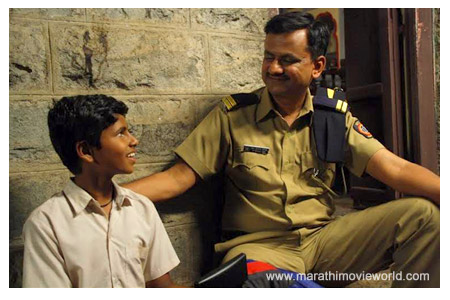
More than the story of the Policeman (Girish Kulkarni) serving for Maharashtra Police and posted in Mumbai and an Army Soldier (Sanjay Khapre) posted at the border; it is the story of their families and in particular their two children Raghu (Vivek Chabukswar) son of a Policeman and Sada ( Abhishek Bharate) son of an Army Soldier The film goes on to narrate the story of these two children, who are good friends. But, goes on to show, how they develop differences, while making collections for charity purpose, considering it as a competition, to win a medal for maximum collections.
Very cleverly, the director takes the audience into their typical village lifestyle, to show their playful days and how they face the grave situation. ‘Salaam’ is a simple story which is very effectively passed on to the audience, through its well presented screenplay. Every situation in the film, has a message to convey; be it the doubt in the mind of Raghu, as to who is superior? A Policeman or an Army soldier? Then, the break up of friendship between the two little friends, doubting each other’s integrity over collection of funds for charity and finally, the realisation of friendship, by Raghu; in the concluding scene . All these incidences have been very cleverly sequenced in the film.
Director Kiran Yadnyopavit has rightly used Albert Einstein’s quote before the start of the film ” If you want your children to be intelligent, read them fairy tales. If you want them to be more intelligent, read them more fairy tales.” And, he has succeeded in conveying the actual meaning, through this film. At the end of the film, he goes on to remind you of Helen Keller’s quote, ” All the world is full of suffering. It is also full of overcoming.” Though, he hasn’t displayed the same on screen.
Best thing about this film is the coming together of three people, who have won national awards. Girish Kulkarni, who plays a Policeman is at his best, offering his natural skills; though he doesn’t have much scope for acting. But, Vivek Chabukswar has tried to do better, expressing his emotions well, through many important scenes in this film. He has turned out to be the real hero of this film. The third national award winner behind the screen, is a techie – Sound designer and mixing Engineer Anmol Bhave, who has also done a commendable job; which is clearly noticed in many outdoor scenes.
Among the other performers, Aatisha Naik as Raghu’s mother has played a totally different role of a kind hearted wife and mother in this film. Jyoti Chandekar as the grandmother, is impressive. Sanjay Khapre has played his limited role, with ease. Kishore Kadam as the head of the village school has done a good job, while Shashank Shende, Suhas Shirsat, Praveen Tarde, Siddheshwar Zadbuke, Savita Prabhune ( from Baramati) and the other six children have supported very well.
The film has only two songs; but the background music offered by Rahul Ranade is very apt for this type of film. All in all, ‘Salaam’ is a sensible film, and is a tribute to the families of those brave soldiers and policemen; who are used to face grave situations in their life and to overcome them.
‘Dhamak’ serves Bollywood recipe on Marathi platter
 |
Rating: ★★★
Studio / Presenter: Cs Films Producer: Suvarna Bandiwadekar Director: Rajendra Bandivadekar Editor: Ashish Mhatre, Apurva Motiwale Cinematographyer: Prasad Bhende Music: Nimal Kumar Cast: Aniket Vishwasrao, Girija Joshi, Ashok Samarth, Shoneel Shinde, Ajay Padhye, Jaywant Wadkar, Viju Khote, Girish Salvi, Dhanjay Mandrekar, Maushami Tondwalka, Vidhyadahar Joshi … Movie Review by: Ulhas Shirke |
After making a sensible film like ‘Zale Mokale Aakash’ , film maker Rajendra Bandivadekar now seems to be inspired by all those aspects adopted by commercial films, which are much needed to entertain the audience and reach out to maximum people . In his latest released film ‘Dhamak’, which has been independently written and directed by him, he has presented all those sequences, required for the recipe of a typical formula film. His inspiration comes from all those Bollywood films of the past, where the hero coming to city side from a village, poses as a big Boss of a company, though he works as a office peon.
When Morya ( Aniket Vishwasrao) returns to his village, to marry his maternal uncle’s daughter, he finds his would be wife – Gauri (Girija Joshi) , too childish and trying to keep herself away from him. He also faces resistance from the local goon, who resembles ‘Shakaal’ of ‘Shaan’ and does all those acts like Gulshan Grover, be it playing his violin in the rains or targeting young girls. This villain, called Vikram dada (Shoneel Shinde) , who is the son of a politician, believes only three ‘V’s; i.e. Violin, Violence and Victory. So, Morya takes on Vikram dada and his associates one by one , with the help of his village friend Javed ( Ajay Padhye) and three other friends from his town, who come for his marriage. Till interval, he manages to win Gauri’s heart and also dares to challenge the strongman Vikram dada and his group.
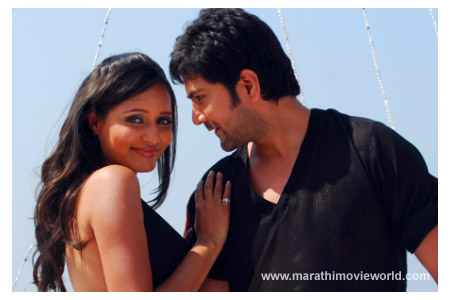
But, in the post interval session, the director has another hero in his mind. So, he presents Inspector Pratap Malvankar (Aashok Samarth), who not only beats up Vikram dada in public place, but also puts him behind the bars, with all evidences against him. So, Morya takes a break and allows Inspector Malwankar to tell his story. There is also a political fight in the form of assembly elections, with Morya’ s uncle Dr. Chachad ( Mohan Joshi) fighting against the corrupt Politician and Vikram dada’s father Bhausaheb Inamdar (Vidydhar Joshi) and winning the elections. All is well at the end; but before that you witness two item numbers by Bollywood dancers Meghna Naidu and Mumaith khan, a romantic song sequence picturised on Morya and Gauri in mod looks and a long action filled fight sequence in the rains between Morya and Vikram dada.
‘Dhamak’ has thus turned out to be a typical commercial formula film, on the lines of Bollywood action films. Watch the very first sequence in the film, where Morya dreams a ‘Deewar’ scene, imagining himself in place of Amitabh Bachchan fighting all alone with a group of criminals, locking them up in their own den .There is no compromise by the film maker on budget, while shooting the glamour filled dances, stunt filled action scenes and while displaying wonderful dress designs of Girija Joshi in a dream song sequence at picturesque location. The crowd scenes and dances are well handled, with good choreography by Umesh Jadhav and excellent camera work by Prasad Bhende. Music by Nirmal Kumar is just fine.
Aniket Vishwasrao does well as Morya, playing both comedy and action well. But, in the post interval session, he literally ceases to be the hero of the film. His role is taken over by Ashok Samarth, who has his own story to narrate, while displaying his well shaped body & walking style, besides narrating his plans to trap Vikram dada. Girija Joshi has good scope to display her acting skills, as a typical innocent village girl, in the first session of the film. But, in the post interval session, she looks more glamorous, with her changed appearance, especially in the dream song sequence with Aniket. Mohan Joshi as Dr. Chachad and Morya’s maternal uncle, does a good job, like a versatile actor. He gets good support from Uma Sardeshmukh, who plays his wife in the film.
Bad man Shoneel Shinde has got ample scope to display his muscles, but the Hindi theatre artist who makes his debut in Marathi, finds less scope to display his acting potential. Most of the time, he is at the receiving end, being beaten up either by Morya or Inspector Malvankar. So, it is Ashok Samarth, who finds a good scope in post interval session. He seemed to be favourite of the director, for the manner in which he has been projected, in this film, with a lot of soft corner towards his character. Jaywant Wadkar, Viju Khote, Girish Salvi, Dhanjay Mandrekar, Maushami Tondwalkar and others offer good support. Vidhyadahar Joshi arrives almost towards the concluding part of the film, to display his typical style of a selfish politician. But, Ajay Padhye, playing a Muslim youth and a family friend of Chachads, invites attention with his notable performance in this film.
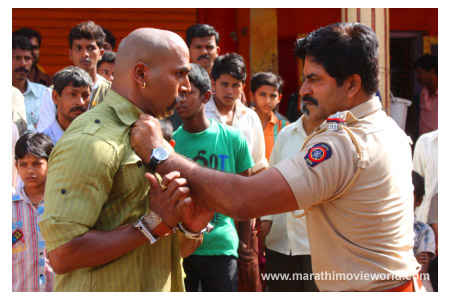
‘Dhamak’ has served a typical Bollywood recipe for the masses. It is certainly not the kind of film to receive appreciation from critics. One can understand the desperation of the film maker, to make such a commercial film, only to receive recognition, after attempting a sensible film like ‘Zale Mokale Aaakash’ last year and going unnoticed. Not a bad idea, Mr. Bandivadekar. But, we expect a better film from you next time. Not a Bollywood formula, again.
‘Campus Katta’ offers formula of traditional entertainment
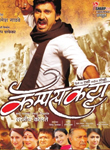 |
Rating: ★★ ½
Studio / Presenter: Sharp Eye Production Producers: Prathamesh Gadwe Writer, Director: Sanjeev Kolte Cinematographyer: Jitendra Acharekar Music: Pravin Kuwar Cast: Santosh Juvekar, Namrata Gaikwad, Sheetal Dabholkar, Vikram Gokhale, Milind Shinde, Arun Nalawade, Swati Chitnis, Kishori Shahane, Rahul Dongre Movie Review by: Ulhas Shirke |
Come election time and it’s the time for the youth of Maharashtra to come forward and fight corruption by Politicians in the society. This seems to be the motive of some of the film makers today. And, director Sanjiv Kolte is nowhere behind, in presenting such a timely subject through his latest released Marathi film ‘Campus Katta’. Set on the backdrop of a college at a district place of Maharashtra, owned by the politicians Annansaheb Gunthe Patil (Arun Nalwade) and Kolse Patil (Milind Shinde). The ultimate aim of these two politicians is to make quick money, through donations for admissions, through the few educational institutes owned by them, making profits in catering services and selling the extra land meant for recreation purpose. But, they face stiff opposition from College student’s leader Raja Shinde (Santosh Juvekar), who prefers to remain in the same college for years, fighting corruption at administrative level in the college.
Being a dynamic leader, Raja has his own followers from the college, who are always there for staging demonstrations every time, when ever there is a need to pressurise the management. He has a well wisher girl friend Rasika (Sheetal Dabholkar), who also poses as a journalist for a TV channel, besides being member of his college katta. In comes Sakhi (Namrata Gaikwad), daughter of new college principal Kochrekar (Vikram Gokhale); who also becomes a great admirer of Raja Shinde, watching his fight against injustice. As the time progresses, we see the love blossoming between Raja and Sakhi, disappointing Rasika, who is also close to Raja’s mother. But, like a good friend, she accepts Raja’s decision and remains by his side, like a loyal friend.
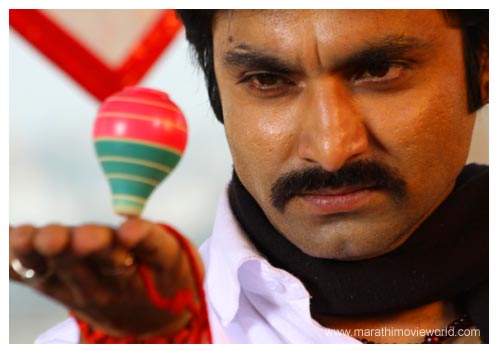
Raja’s methodology is not acceptable to the new principal, who feels that he is nothing but a hot headed irresponsible leader with no future. But, looking at the way the trustees putting pressure on college management, he later realises the presence of Raja in dealing with such corrupt people. But, in the process, he has to sacrifice the life of his own daughter, who marries Raja; but cannot make him happy. So, it’s a happy end after a tragic turn, in the concluding part of the film.
Instead of presenting a strong conflict, the film has just remained representative about the different characters; be it the protagonist Raja, the two corrupt selfish politicians, a straight forward college principal, a typical young villain, a so called name sake female journalist and the team of forty loyal students, always with Raja.
Except for the character of Santosh Juvekar and Vikram Gokhale, there is no force noticed in the other characters. The confrontation of Sakhi with her parents for siding Raja, sounds very unnatural, than being realistic in the screenplay. The two politicians played by Arun Nalawade and Milind Shinde are neither funny nor terrifying. Even the new villain – Rahul Dongre playing their right hand to counter Raja, looks very unimpressive, with the kind of weak role entrusted to him.
The two girls Namrata Gaikwad and Sheetal Dabholkar are just namesake, though they have few songs to their share. It is Santosh Juvekar, who dominates, throughout the film. There are other characters like Raja’s mother played by Kishori Shahane, Sakhi’s mother played by Swati Chitnis and others around. But, they have very less to their share, except for being part of emotion filled scenes. The film has failed to define the roles of certain characters, like the one who is always with Raja and whom Rasika calls ‘Sir’. Even, it is not clear, what exactly Rasika does? If she is a student of the college, what way, she is associated with a TV channel? A freelancer or a full time journalist?
Barring these lapses, the film still manages to present the subject of united fight of the youth against the corrupt education system, in director Sanjiv Kolte’s style; using lot of emotional content in this otherwise action filled film. There is good scope for music by Pravin Kunwar, using the songs at festive occasions. As a result, the film appears as an ordinary formula entertainer, filled with emotions.
‘Yellow’ inspires with ‘You can do it’ message
 |
Rating: ★★★★
Studio / Presenter: Viva In En, Mumbai Film Company Producers: Riteish Deshmukh , Uttung Hitendra Thakur Cinematographer, Director: Mahesh Limaye Story: Ambar Hadap, Ganesh Pandit Music: Kaushal Inamdar Cast: Upendra Limye, Mrunal Kulkarni, Hrishikesh Joshi, Aishwarya Narkar, Usha Nadkarni, Gauri Gadgil Movie Review by: Ulhas Shirke |
Rob Liano, the Rock Star Success Coach & Sales Strategist has rightly said, “Nothing is born into this world without labour.” And, if we can recollect Walt Disney’s strategy, ‘If you can dream it, you can do it'; then, there is nothing impossible in this world. Based on this philosophy, producers Riteish Deshmukh and Uttung Thakur have offered a sensible Marathi film ‘Yellow’, which is directed by renowned cinematographer Mahesh Limaye. By the way, Mahesh also makes his debut as a director with this film.
Only last year, we saw director Manohar Sarwankar’s film ‘Maat’, which was also debut of Eshaa Koppikar in Marathi and which talked about the success story of a ‘deaf-mute’ girl, who turns a Chess Champion, with the support of her mother; who has been deserted by her selfish husband; only because the child is born with a handicap. However, through this film – ‘Yellow’, director Mahesh Limaye presents a real life success story of a girl, born with ‘down syndrome’. And, he has done a commendable job, as presenting a real life character – Gauri Gadgil, who has already won two silver medals in Special Olympics; has made ‘Yellow’ more appealing than ‘Maat’.
Mugdha (Mrunal Kulkarni) and Shekhar (Manoj Joshi) give birth to a girl – Gauri, who is born with ‘down syndrome’. Mugdha , who is already a teacher, wants her daughter to study in the same school, with normal children. But, when she finds her score in IQ as 65, the principal suggests her to admit Gauri to a special school. However, Shekhar is unable to accept Gauri as his daughter and suggests Mugdha to go for second child. One day, Mugdha gets the biggest shock in her life, when she witnesses Shekhar let Gauri drowned in a water tank at a resort, instead of running to help her out. Taking an immediate decision to leave her husband, Mugdha arrives at her brother Shree’s (Hrishikesh Joshi) house, who being a bachelor, offers all the love and affection to Gauri, besides managing his ‘tent house’ business.
When, Mugdha admits Gauri to a school for special children, Prinicipal (Aishwarya Narkar) suggests her to join the school, as a teacher. On the advice of the principal, Mugdha is advised to admit Gauri for swimming, noticing her keen interest and especially for improving her ‘hand and eye’ coordination. It is at this place, Gauri interacts initially with a good elderly coach and later with a strict coach – Pratap Sardeshmukh ( Upendra Limaye), training at advanced level. It is at this stage, the film goes on to describe how such children are to be treated, to extract the best out of them.
Director Mahesh Limaye, has beautifully captured the emotion filled moments through his camera lenses, besides directing the most difficult sequences, in an efficient manner, generating humour at short intervals, through light humour filled scenes. Ambar Hadap and Ganesh Pandit have really worked hard, to present an engaging screenplay with the support of wonderful performances from all the artistes. Mrinal Kulkarni, who has played Gauri’s possessive mother, has been able to display perfect emotions of a worried mother, while Manoj Joshi has cleverly presented a selfish husband through his limited role.
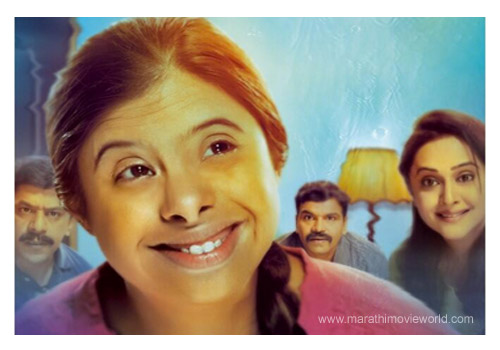
There is no doubt about the brilliant natural performance given by Gauri Gadgil, as this was her own real life success story; but the little girl performing her childhood role, also looks very natural. In fact, Gauri actually appears on the screen only few minutes before interval, when her coach for advance training – Upendra Limaye also arrives on the screen, around that time. Upendra has also given a fantastic performance, understanding very well the given situation and more particularly, the attitude of all such Indian coaches in different games, at competitive level. However, the most impressive performance comes from Hrishikesh Joshi, who looks very natural, in the character of Gauri’s real well wisher and caring uncle. It is because of his presence, there is some humour generated, in this otherwise thought provoking film.
Through this film, the director has also presented the attitude of a typical sports coach, who always demand more from their students, without paying the required attention on sports psychology and the much desired counselling, expected from them. At the same time, he has also shown how the parents interfere with the training methods of the Coach, by showing their regular presence, at the practice venue of the sport. ‘Yellow’ is certainly an inspiring film and a must watch for all. There are very few errors noticed in the film; as it is otherwise a technically well presented film, with good background music provided by kaushal Inamdar.
‘Taptapadi’ sets the best example of a good period film in Marathi
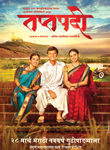 |
Rating: ★★★★
Studio / Presenter: Aryaman Publicity Producer: Sachin Baliram Nagargoje, Hemant Bhailal Bhavsar Screenplay, Direction: Sachin Baliram Nagargoje Cinematographer: Santosh Suvarnakar Music: Sumeet Bellari & Rohit Nagbhide Cast: Kashyap Parulekar, Veena Jamkar, Shruti Marathe, Neena Kulkarni, Sharad Ponkshe, Ambarish Deshpande, Ashwini Ekbote Movie Review by: Ulhas Shirke |
Script plays a very important role in the success of Marathi films. And, when you come to know that the script of a Marathi film is inspired by Ravindranath Tagore’s story; obviously, there will be lot of curiosity about the film. Young film maker Sachin Baliram Nagargoje has dared to present this sensible period story, through his new Marathi film ‘Taptapadi’.
Set on the backdrop of pre independence days period, the film revolves around Meera (Veena Jamkar) who has been brought up by her paternal aunty and her husband (Ashwini Ekbote and Sharad Ponkshe) since her childhood, after the sudden demise of her mother. At her Aunty’s place little Meera becomes friendly with her cousin Madhav (Kashyap Parulekar) who is later sent for his higher studies to Pune. When Madhav returns after a long period, while doing his graduation in medicine; he develops intimate relationship with Meera and the relationship turns into their marriage.
Both live happily, till Meera has a miscarriage. Madhav and Meera shift to Pune, where Madhav is studying in medical college. Not understanding the growth of Glaucoma in Meera’s eyes, Madhav treats her for general irritation. In the process, her trouble aggravates, with poor vision. Finally, when Madhav’s medical college surgeon examines her and suggests immediate operation, it is too late. Meera turns blind. Her aunty, uncle, brother and father suggest Madhav to let her go along with them, so as to take good care of her. But, Madhav feeling the guilt of neglect, wants Meera with him. He takes good care of her.
One fine day, his paternal aunty Durvabai (Neena Kulkarni) arrives at his place, with a plan in her mind. She wants her own well educated niece Sunanda (Shruti Marathe) from Mumbai to marry Madhav. She even invites her to Madhav’s place. And, then begins the real drama. Though, Sunanda becomes friendly with Meera, the negative thoughts running in the mind of Meera makes her more uncomfortable and she displays her anger and frustration., After taking Madhav into confidence for second marriage, Durvabai leaves with her niece. But, destiny has something else to decide. The climax scene of the film, says it all.
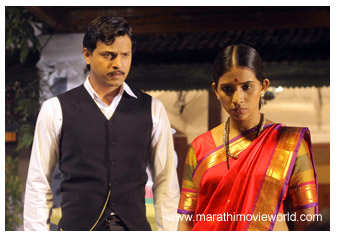
Director Sachin Nagargoje has handled this sensitive love story very well. Having written the screenplay himself, he has been able to present the emotion filled scenes very well. Being a period film, he has cleverly avoided outdoor scenes. But, with the support of good cinematography by Santosh Suvarnakar, he has handled the intimate love scenes very well. Considering Ravindranath Tagore’s love for poems and keeping in mind his love for art; both music and art direction have been well executed in the film. The locations and use of bullock cart, horse carriage and the old styled car used by Madhav, clearly remind you about the old period. Singer Savani Shende, lyricist Vaibhav Joshi and music directors Sumeet Bellari & Rohit Nagbhide have done a good job.
However, the director hasn’t paid attention on miniature details of the make up of Meera, especially after she suffers burn injuries. The healing of wounds on her right hand and face, haven’t been followed in continuity properly. But, barring this small error, he has succeeded in presenting this film very well. Wonderful performances by all the artistes, makes the film more realistic. It is almost like listening to the story of Meera, who is also a narrator in this film.
No wonder, Veena Jamkar has put in her heart into the role of Meera. Even otherwise, she has always been a great performer; but, this role is something special for her. In the character of Sunanda, Shruti Marathe does look a perfect choice. She has played this bubbly cheerful Sunanda with complete understanding of the importance of her role. Kashyap Parulekar, has played his most difficult looking character of Madhav very well. He has cleverly displayed the quick change of emotions, at every important situation, be it, his guilt after his wife turns blind or his reaction while confessing the truth before his wife. In short, he too has proved his selection right.
In the role of Durva atya, Neena Kulkarni has once again proved that she is still the best; no matter whatever type of role comes to her share. The selection of Sharad Ponkshe and Ashwini Ekbote for their respective roles, is just namesake. At least Ashwini has two scenes to display her acting; but Sharad Ponkshe has been wasted, just as an onlooker in few scenes to his share. Ambarish Deshpande has done a good job, in the role of Meera’s brother, though he has little to his share. All others in the supporting cast, including the kids in initial part of the film, look very realistic in their respective costumes, suited to the era.
‘Taptapadi’ sets the best example of a good period film in Marathi; and does succeed in leaving an impact of its tale on the audience. It is certainly a worth watch.
Feature film on Yashwantrao Chavan is a tribute to the iron man of Maharashtra
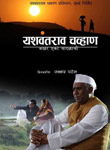 |
Rating: ★★★ ½
Studio / Presenter: Yashwantrao Pratishthan, Essel Vision Producer: Maharashtra Shasan Director: Jabbar Patel Screenplay: Arun Sadhu Cinematographer: Sikandar Sayyad Music: Anand Modak, Cast: Ashok Lokhande, Om Bhutkar, Lubna Salim, Vaishali Dabhade, Meena Naik, Rekha Kamat, Supriya Vinod, Satish Alekar, Rahul Solapurkar Movie Review by: Ulhas Shirke |
Yashwantrao Balwantrao Chavan was a big name not only in Maharashtra Politics but also in the Indian Politics. Having served as the Chief Minister of Bombay state, then being the first chief Minister of independent Maharashtra, followed by the various cabinet ministries, he represented at the centre; he was highly respected politician in the state. But, after becoming the third chief minister of then Bombay state in 1956 and little before that when he was in the cabinet of Morarji Desai; he was targeted by the opposition leaders and few media persons, for not joining the United Maharashtra Movement.
Mr. Yashwantrao Chavan passed away in 1984, at the age of 71, when he was serving as the Chairman of the 8th Finance Commission of India. But, his contribution as a leader of Maharashtra and India certainly needed a detailed biopic on his life. And, the Yashwantrao Chavan Pratishthan and Government of Maharashtra thought that it was the right time to pay him tributes, besides making the new generation aware of his political journey. ‘Yashwantrao Chavan – Bakhar Eka Vadalachi’ distributed by Essel Vision, is the most suited title of this film, directed by Dr. Jabbar Patel, which is released today. Unfortunately, in spite of the heavy advertising campaign on Zee Marathi channel, the film has not received the desired response at multiplexes in Western suburbs. At one of the multiplexes, for 3.15 pm show, there were just 12 people, which was unfortunate.
The film begins with two Political science students doing research and taking keen interest in the political career of Yashwantrao Chavan. They request one senior History Professor (Nana Patekar) to share with them the political journey of this eminent leader from Maharashtra. Beginning with his funeral, he takes them down memory lane, narrating his childhood, full of struggle, and then explaining how he became part of the Quit India movement as a youngster, immediately after his marriage.
Giving a complete account of his poverty and motivation from mother and Uncle to offer him good education; the film goes on to show the biggest storm in his life, during the United Maharashtra Movement , when the opposition leaders and section of Marathi press criticised him for not resigning from the Ministry, in protest against the killing of 105 people in police firing on the orders of Morarji Desai and Centre’s delay in announcing Maharashtra as a separate state with Mumbai as its part. After showing this crisis, even after becoming the chief minister of independent Maharashtra, the film takes you to Delhi, in the second part of the film, to show his progress in the Indian cabinet and at the same time how he had to make adjustments with Mr. Jawaharlal Nehru and Ms. Indira Gandhi, during his tenure as minister with important portfolios in their cabinet.
The film has also shown how he had difference of opinion with Ms. Indira Gandhi, over the selection of candidate for the president of India and also due to interference of Sanjay Gandhi in Centre’s politics. His joining Congress(U) after the defeat of Indira Gandhi and later returning back to Indira Gandhi’s Congress(I) after her return to power with victory. But, the film clearly shows how he was treated after that, offering just the post of Chairman of Planning Commission.
In short, this film is a complete biopic of the strongest leader from Maharashtra, who had risen to the heights in Indian politics, just missing the prime minister’s chair, because of his big heart. The film has however, tried to make critical remarks on great freedom fighter Vinayak Damodar Savarkar, for his ‘Hindutva’ principle, which was not necessary. But, it clearly indicated that through this film, the producers took a chance to criticize the biggest opposition party, with the same belief. Isn’t that a clever timely move by Maharashrta Government? The film has also conveniently avoided to show Balasaheb Kher, the first Chief Minister of Mumbai state, though his cabin has been shown in a scene where Mr. Chavan goes to meet him. But, in his absence, meets then Home Minister of Bombay state, Mr. Morarji Desai, in the next cabin.
In the post interval session, the film almost takes bilingual form in dialogues in English and Hindi, as the scene shifts to Delhi. There are Marathi dialogues, but Mr. Chavan’s interaction with Pandit Nehru and Indira Gandhi are in English and Hindi. In the role of Jawaharlal Nehru and Indira Gandhi, Benjamin Gilani and Supriya Vinod have given satisfying performances. Yashvantrao’s role during his younger days has been played by actor Om Bhutkar with total commitment; but actor Ashok Lokhande who portrays senior Yashwantrao Chavan, gets an opportunity to skilfully present his cool attitude and changes in his political career, right from the period 1946 till his death in 1984. And, he has done a good job. In the roles of his wife Venutai, Vaishali Dabhade, plays the part during his younger days; which is later taken over by Hindi stage actress Lubna Salim, who finds a major part as his companion. Both have given good performances; but, Lubna Salim’s dialogue delivery is not very impressive. Her different accent in comparison to Vaishali Dabhade, who played her younger day’s character; could be easily noticed.
Good performances come from Meena Naik, who plays Yashwantrao’s mother and others in the supporting cast. However, it is not known, why Meena Naik has been replaced by other actress, to play the old mother of Yashwantrao? When there was a reputed award winning make-up man like Vikram Gaikwad as part of the crew, he would have certainly make her look more older. There are many meaningful songs rendered by many popular singers in this film, including a lavani, picturised on Bhargavi Chirmule; but, they are not lengthy and are suited just for the right occasion. Camera by Syed Layauet Ali, art direction by Shyam Bhutkar & Mohan Ratnaparakhi, editing by Nitin Rokade and music by Anand Modak are worth appreciating.
As a director Dr. Jabbar Patel has presented the film well, with good support coming from the screenplay of noted writer Arun Sadhu, not forgetting to mention all those politicians of his time and giving due credit to Yashwantrao for some of his crucial decisions taken during his tenure as Defence, Finance and Home minister of India. More importance has been given to the political leaders, with whom Yashwantrao was closely associated, besides his family members. Don’t treat this film as a documentary. But, watch it, considering it as a feature film. It is certainly an inspiring film for today’s young politicians, coming from district places. It’s also a tribute to Iron man from Maharashtra.
‘Dhag’ is a path breaking Marathi film
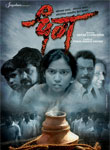 |
Rating: ★★★ ½
Studio / Presenter: Jayashree Motion Picture Producer: Vishal Pandit Gaware Director: Shivaji Lotan Patil Screenplay: Nitin Dixit Cinematographer: Naagraj Editor: Nilesh Gavand, Cast: Upendra Limye, Usha Jadhav, Hansraj Jagtap, Nagesh Bhosale, Suhasini Deshpande, Neha Dakhinkar Movie Review by: Ulhas Shirke |
There have It is very difficult to know the reason for delay in releasing this path breaking Marathi film ‘Dhag’ during the year 2013, when the film had won National award for best direction and in best actress category, besides receiving special mention of the Jury for the child artiste, in March 2013. But, if this film was released last year, it would have made a big difference. However, it is always ‘better late than never’.
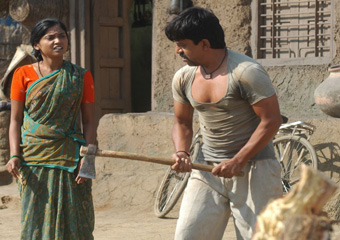
‘Dhag’ is now finally released this week. Produced by Vishal Pandit Gavare and directed by Shivaji Lotan Patil, the film was also highly appreciated by the critics at 2012 PIFF and Goa Int Film Fest. It also received the appreciation of Jury, including Academy awards winner Resul Pookutty. The film had also received appreciation from dignitaries like Saie Paranjape & Shabana Azmi. Last year, the film had won 6 awards in Ma Ta Sanman
Needless to say that ‘Dhag’ is an off beat Marathi film, which revolves around a teenager Krishna (Hansraj Jagtap), living in a village with his father Shripati (Upendra Limaye), who operates at the only crematorium in that village. Mother Yashoda (Usha Jadhav) a housewife, an old Grandmother and a younger sister are his other family members. Krishna doesn’t seem to be interested in carrying forward the family tradition of managing a crematorium and hence prefers to study at a village school. He even does a part time job at a juice centre, besides attending school, when he finds that his family is facing financial crisis. However, the harsh comments from his teacher about his family’s profession, forces him to drop out of the school.
The film goes on to show how Krishna’s family is solely dependent on the money earned during the last rites performed and hence, when there are no deaths in the village, Shripati has to find some temporary work at his friend- Mangya’s workshop. Still, he doesn’t get paid for his services, as his friend’s wife is ill and bed ridden. One day, Shripati dies of snake bite and the whole family is traumatized. Mangya takes care of the family; but, Krishna and his mother are hesitant to approve his help. Krishna’s grandmother also warns her daughter-in-law about Mangya’s intentions of being so generous. When Krishna hears their discussion, he realizes his duty at that time. So, he steps into his father’s shoes; and also starts attending school for a better future.
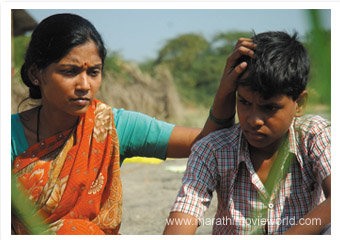
‘Dhag’ is a very realistic and thought provoking film. Director Shivaji Lotan Patil, who had earlier directed a sensational film ‘Vaavtal’, offers this sensible subject . The film has one national award winning actor Upendra Limaye and with Usha Jadhav also winning the national award for best actress, for her performance in this film; whatever praise about their performances will be less. Usha has already received compliments from Bollywood, with her selection in ‘Bhootnath 2′ in presence of Amitabh Bachchan. Upendra has limited scope; but, he has impressed through his role. Moreover the director also having won the National award for best direction, goes on to say everything about his excellent work. But, the talented child actor Hansraj, who also received special mention from the Jury at the last national awards, deserves all the praise.
The performance of this child artiste, is more appealing in the film. Good support also comes from supporting artistes Nagesh Bhosle, Suhasini Deshpande, and Neha Dakhinkar . Excellent presentation of Screenplay by Nitin Dixit, good cinematography by Naagraj, perfect editing by Nilesh Gavand, suitable music composition by Aadi Ramchandran and Amit Gupta’s sound design have added value to this thought provoking film, which is a ‘must see’ for all.
‘Akalpith’ presents a psycho thriller with a mind game
|
Rating: ★★★
Studio / Presenter: Nought Creation Producers: Prasad Ugle, Harshal Ushir Writer, Director: Prasad Acharekar Cinematographer: Neeshank Mathure Backgroundscore: Saurabh Bhalerao Cast: Dr. Mohan Agashe, Nirmitee Sawant, Atul Todankar, Renuka Shahane, Abhinay Sawant, Rutul Patil, Ashutosh Patki, Sumedh Gaikwad Movie Review by: Ulhas Shirke |
Psycho thrillers are not new to Marathi film industry; but, a mind twisting psychological thriller with a gripping screenplay is really something new to Marathi cinema. Writer-Director Prasad Achrekar, who is the grandson of legendary art director M. R. Achrekar, has offered his debut film ‘Akalpith’, with the help of young Snehal Pendurkar, who besides writing this riveting screenplay, has also handled the graphic art of this film, during flashbacks very well.
‘Akalpith’ begins with the special meeting of the Jury with the judge, where the public prosecutor seeks the help of a renowned female psychologist, to study the past history and the statement of the alleged psycho killer. As their proceedings go on, the film also shows the actual happenings that led to a situation, where the accused pleads ‘not guilty’ and poses himself as a sick person, suffering from a trauma; as argued by the defence lawyer.
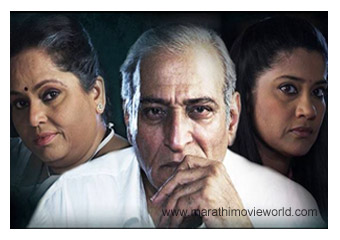
Dr. Mohan Agashe, Renuka ShahaneThe actual argument and discussion on the case begins in post interval stage, after the audience witness the entire episode of the actual happening, till the accused is shown with a pistol in his hands, about to fire his shots at his wife and his cousin, who together had planned his murder at the cousin’s bungalow, located at a remote place.
The film begins with the Public prosecutor Ms. Saranjame, seeking the help of a renowned psychologist (Renuka Shahane) to study the case of a young murder accused, who is trying to prove himself innocent, with the help of a defence lawyer, in absence of the evidence. She wants the psychologist to help her to prove the heinous act of the accused; during the meeting of the Jury with the judge. Simultaneously, we witness on the screen, the actual happening of the event, as recorded by the accused Milind (Abhinay Sawant) in his statement. So, we find his wife Shweta (Rutul Patil) making quick phone calls to unknown persons.
When both husband and wife leave for a long drive on a weekend, they come across Milind’s cousin Vishal (Ashutosh Patki), who suggests Milind and his wife to spend the week end at his bungalow at a remote place, which is close to the place they meet . So, it is known to the audience that it’s a planned trap for Milind. A terrible looking watchman guarding the bungalow that night and warning them not to step out of the bungalow suggests the past history of that place with series of unsolved murders taken place around in the past.
As everything gets set as per the plan, a stranger with the name of Raj (Sumedh Gaikwad) walks into the bungalow, for shelter as his car goes out of order. He tries to make a phone call; but doesn’t get his line. Shweta misunderstands him as a hired killer; having arrived a day before and is confused. But, he turns out to be from the same college of Milind. So, both Milind and Raj come closer talking about their good old college days, that night. In the meanwhile, Raj comes to know about the affair between Vishal and Milind’s wife. He is asked to keep quite by Vishal. In the meanwhile, Shweta and Vishal’s plan to kill Milind, is foiled by Milind himself. Next day morning, when the real contract killer arrives, he too is confused about his target, after noticing three men around, instead of one.
Milind with the help of Raj, manages to convince the contract killer, offering more money and Milind acquires the pistol from the contract killer, aiming it at his wife Shweta first; when the film breaks for interval. In his defence, Milind claims that he could not remember anything after that scene; and that he had lost his memory. However, in post interval session, when the judge asks to present him before the jury, Milind is brought with his hands tied on a wheelchair. During this trial,( which is held in house, instead of the courtroom); he reveals the judge two new stories, recollected by him; while he was brought by Raj in a car back to Mumbai. The psychologist is almost close top grill Milind, on the basis of his past and recent paintings, when the judge gives his final verdict. The film ends with an unexpected climax, which is all about the mind game. So, watch each and every scene in this film, with full attention.
In the role of Milind , Abhinay Sawant finds a good lead role, to open his actual innings in Marathi films, though, he had appeared before in a small role through Kedar Shinde’s multi starrer film. Music director Ashok Patki’s son Ashutosh Patki also makes a good debut, in second lead, through the role of Vishal. In the role of Shweta, Rutul Patil makes an impressive debut. Having performed on stage, this Nashik girl looks very confident in every scene that she has to her share. Another newcomer Sumedh Gaikwad has also played his part like a true professional actor, though in real life, he is a still photographer. Among the supporting artistes, Dr. Mohan Agashe, Nirmitee Sawant, Atul Todankar, Renuka Shahane and others, have performed their roles with full conviction, and very naturally. Director Prasad Achrekar has handled the direction of this film very efficiently. It wasn’t an easy job; but having been influenced by the stories of Sherlock Holmes, he has received good support from Snehal Pendurkar in the screenplay.
Those who love to watch psycho thrillers, this film is a real treat for them. Young Cinematographers Amit Suresh Kudoth and Nishank Mathure, offer a visual delight, by generating interest, in every scene. Background score by Saurabh Bhalerao is well suited to this novel plot in Marathi cinema. The film does have few flaws, but looking at the sincere effort of the young team in presenting this psycho thriller, they can be ignored. Good work Prasad; keep it up..
Mystery filled ‘Sau Shashi Deodhar’ is an absorbing fiction
|
Rating: ★★★ ½
Studio / Presenter: Needle Drop Productions Pvt. Ltd., Orange Tree Productions Pvt. Ltd. Producers: Shilpa Shirodkar Ranjit, Kushna Shetty Writer, Director: Amol Shetge Dialogues: Kaustubh Savarkar Cinematographer: Suresh Deshmane Editor: Rajesh Rao Cast: Sai Tamhankar, Ajinkya Deo, Tushar Dalvi, Shilpa Gandhi, Avinash Kharshikar, Aniket Kelkar, Anushka Ranjit Movie Review by: Ulhas Shirke |
After a long time, there is a Marathi film, which has a good narrative story, filled with suspense. ‘Sou Shashi Deodhar’ is actually a mystery filled film, which is well presented by director Amol Shetge, who has himself written the story of this film. You may also call it a psychological thriller, which revolves around a middle class young married woman, who identifies herself as Ms.Shubhada Shashi Deodhar, after she recovers from a hit by the car driven by Dr. Ajinkya Vartak, during one rainy night.
Since it is a road accident, it involves police investigation and Dr.Ajinkya is held up in the hospital, till the young woman gives her statement to the police, after her recovery, admitting that it was her own fault, as she lost her balance. But, her real identity still remains a mystery; as Dr. Ajinkya, who has been asked by the police officer to drop her at the address given by her, turns out to be owned by somebody else. Even the description given by the lady about her husband, does not match with the person located. Finally, the police issue an advertisement in the newspaper, with her photo and till that time, the lady finds shelter at Dr. Ajainkya’s house. Being a bachelor and a psychiatrist, he not only takes good care of her; but, also does the job of police department, to locate Shashi Deodhar, with the help of a social networking site.
In the meanwhile, reading the advertisement, a young man Mr. Thakur( Aniket kelkar) with his one leg injured, walks into the police station, claiming the young lady as his wife- Nilima. But, the young lady refuses to identify him as her husband. So, the husband asks the police to take her to her father; who identifies her as his daughter. But, the lady claiming herself as Shubhada, is then brought in contact with Mr. Shashi Deodhar and his real wife Shubhada. Even after meeting them, the lady tells Dr. Ajinkya that she does not know them. Finally, Dr.Ajinkya, with her consent and taking the police officer into confidence, injects her with sodium pentothal drug, to make her confess the truth, in the concluding part of the film.
From start till the end, director Amol Shetge has cleverly kept the pace of the film, holding the grip on his story. Few scenes in the film look irrelevant. But, very cleverly, he has introduced new characters in the screenplay one by one, to keep the mystery. Even he has taken a break for interval, at the right time, in this little less than 2 hour length film. The concluding part unfolds the mystery in a very systematic manner, to make this film an absorbing fiction. suresh Deshmane’s cinematography is good. Music and background music is apt for this kind of mystery filled tale.
Sai Tamhankar, known for her glamorous roles, has found an opportunity to play a simple middle class married woman, suffering from a split personality disorder. She is highly impressive in a different role, through this film. In the role of Dr.Ajinkya Vartak, Ajinkya Deo has played his part very naturally. He seemed to be a perfect choice for this role. In the supporting cast, Aniket Kelkar, Avinash Kharshikar,Tushar Dalvi, Janardan Parab, producer Shilpa Shirodkar –Ranjit’s daughter Anushka, her husband Ranjit, director Amol Shetge himself and others have offered a good support. Tushar looks different in his new get up.
‘Sou Shashi Deodhar’ has certainly succeeded to bring in that desired change in Marathi films, with a new subject, which is socially so relevant. Thanks to Shilpa and her husband Ranjit for their debut offering. But, the kind of publicity done by the film, it failed to find the crowds at theatres on the first day. Growel- kandivali, witnessed just 10 people, for 1.10 pm show. Hope that the film picks up well, in next two days.
